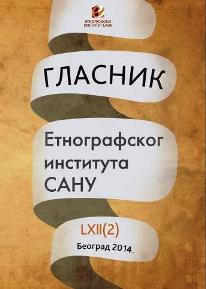Збирка речи Димитрија Чемерикића као извор за етнолингивистичка и етнолошка истраживања
Тhe Lexicon Manuscript by Dimitrije Čemerikić as a Source for Ethnolinguistic and Ethnologic Research
Author(s): Snežana Petrović, Toma TasovacSubject(s): Anthropology
Published by: Етнографски институт САНУ
Keywords: Prizren; dialects; Serbian language; ethnolinguistic; ethnology; Dimitrije Čemerkić
Summary/Abstract: This paper highlights the importance of Dimitrije Čemerikić’s handwritten collection of words from the historic city of Prizren as a valuable resource for the ethnolinguistic and ethnologic study of its colorful, multicultural past. The manuscript, which contains around 16,000 lemmas with definitions and examples, was compiled in the middle of the 20th century. The original is nowadays archived at the Institute for the Serbian Language of the Serbian Academy of Arts and Sciences, while a digital edition has been available since 2013 via the Platform for Transcription of Serbian Handwritten Heritage, http://prepis.org. The paper shows how Čemerikić’s lexicographic treatment of the Prizren dialect reflects various aspects of popular culture (customs, superstitions, witchcraft) and urban life (guilds, social and ethnic relations, etc.) by analyzing exemplary lexemes such dečanska neprelja (lazy female, lit. ‘woman from Dečani who doesn’t know how to weave’), martifal (divination on St. George’s Day), dete (child), kuče (dog), magareći mozak (potion, lit. ‘donkey’s brain’), meso govecko (beef), esnaf (guild), Kaljaja (fortress), Latinka (Albanian Catholic female), kisela mrva (pejorative for Aromanian, lit. ‘sour crumb’), kožuvar (slang for Russian, lit. ‘leather-worker’), Karafera, mladoženja (groom), mladanevesta (bride), and dati (to give).
Journal: Гласник Етнографског института САНУ
- Issue Year: LXII/2014
- Issue No: 2
- Page Range: 171-180
- Page Count: 10
- Language: Serbian

